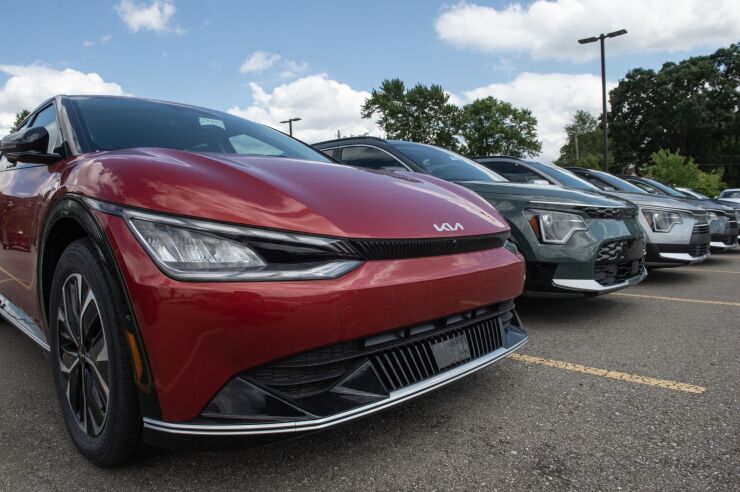
Big banks see an opportunity to grow their business with car dealers, as auto inventories are rebounding in the wake of the pandemic, and two competitors are pulling out of the market.
Capital One Financial and Fifth Third Bancorp both
But auto lending executives at JPMorgan Chase, Wells Fargo and TD Bank said in recent interviews that they're sticking with the sector, and that franchise dealers are in solid shape. They see opportunities as dealers tap their credit lines to finance new cars for their lots, buy other dealerships and invest in infrastructure upgrades to facilitate electric vehicle sales.
"This is a core business of ours," said Cynthia Caine, who heads Wells Fargo Commercial Auto. "We are leaning in to actually expand some of our offerings and our value proposition."
Auto dealers' profits are narrowing a bit in 2023 after a few record-setting years, when the pandemic-driven shortage in new vehicles drove up prices even as sales stayed subdued.
As manufacturers crank up production again, new car prices have moderated. But production remains below historical levels, which has enabled dealers to continue charging elevated prices to consumers.
Gross profits on new vehicles are "still relatively strong" even if they've softened this year, said Charles Arnold, national sales executive for JPMorgan Chase's commercial dealer services group.
"The outlook is still very good," Arnold said. "I think we're very bullish."
The rebound in car production is driving more business to banks, which help dealers finance new inventory from manufacturers. Volumes in floorplan lending haven't returned to historical norms, bankers say, but they've bounced back meaningfully from their pandemic-era lows.
"There's still a bit of a supply shortage out there," said Andrew Stuart, the head of TD Auto Finance. He explained that he likes the "symbiotic" relationship that TD gets by lending to dealers who use TD to provide financing to consumers.
JPMorgan, Wells and TD — along with Bank of America, Ally Financial and other floorplan lenders — may pick up more clients following the exit of Capital One and Fifth Third. Auto Finance News reported on their exits in April.
Adrienne Gutbier, a Fifth Third spokesperson, said the exit was part of the bank's efforts to "continually review our ability to deliver best-in-class solutions to our clients."
"Due to changes in the industry, Fifth Third has decided to no longer support the dealer floorplan product," Gutbier said, adding that the bank "will continue to support dealers — at the local level — in all other facets of a commercial banking relationship."
In a statement, a Capital One spokesperson said it decided to leave the sector in the first quarter and "will be winding down that work this year."
Fifth Third and Capital One both noted their exits from floorplan lending have no impact on their retail auto lending.
The two lenders are among the regional banks that are set to face tougher capital rules from the Federal Reserve — a factor that analysts say is contributing to a
McLean, Virginia-based Capital One said recently that it would sell some $900 million in commercial office loans. And Fifth Third executives have said they're on a "diet" with some businesses as they look to build more capital. The Cincinnati-based bank has also announced it's
The two banks' exit from floorplan lending means larger lenders will continue adding to their share of dealer business, said Erin Kerrigan, the founder of the auto advisory firm Kerrigan Advisors.
In some ways, that trend mirrors what's happening in the auto dealer market: consolidation.
Some dealers, including publicly traded ones, are looking to get bigger by buying competitors or expanding into new regions. Others are eager to sell, partly because the value of their business is high following the pandemic boom in the auto sector.
"The largest dealers are getting larger, and similarly, the banking industry serving auto retailers is consolidating," said Kerrigan, whose firm provides transaction advice to dealers.
Sales of auto dealers jumped to 103 in the first quarter of the year, up sharply from 72 a year earlier and 66 in the first quarter of 2021, according to a report by Kerrigan Advisors.
The uptick in M&A has boosted acquisition lending among the banks that have stuck with the sector.
And though two banks are exiting the floorplan lending business, lawyers who work with the industry aren't seeing signs of a major pullback in credit availability. But they also say the caution banks are displaying throughout their business — monitoring their credit card or office loan portfolios, for example — is extending to the auto dealer space.
Some lenders are taking "a harder look at their portfolios" and increasing the prices that they charge dealers for floorplan loans, said Stephen Dietrich, a lawyer at Holland & Knight who works with dealers. But that's nothing like the massive pullback by lenders during the 2008 financial crisis, when banks abruptly informed dealers their relationships would soon end.
"Nothing like that is happening," Dietrich said. "We're just starting to see perhaps a little bit more attention to the portfolios than there was before."






